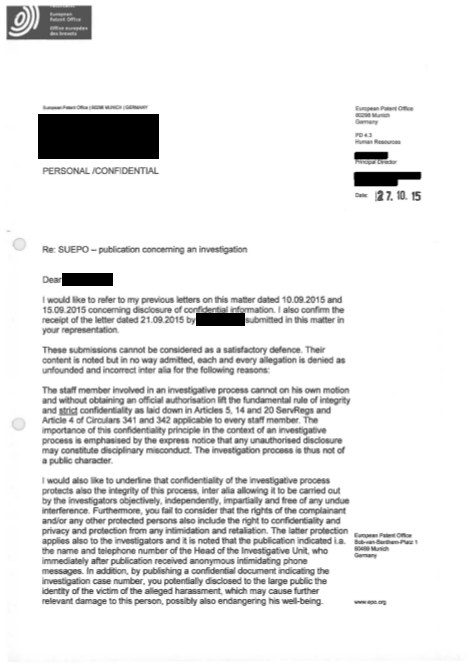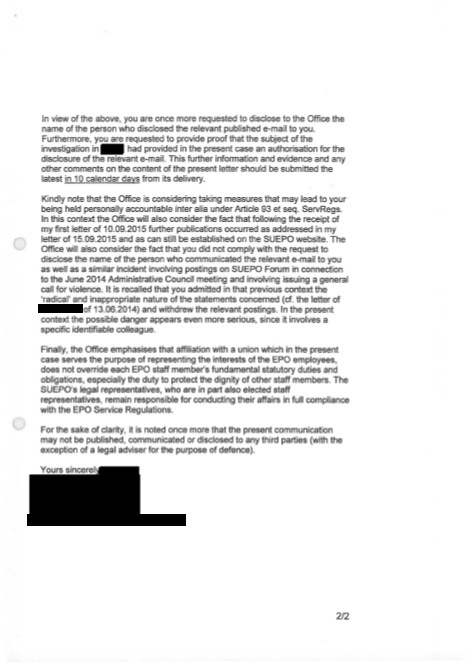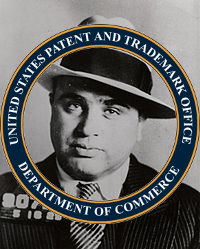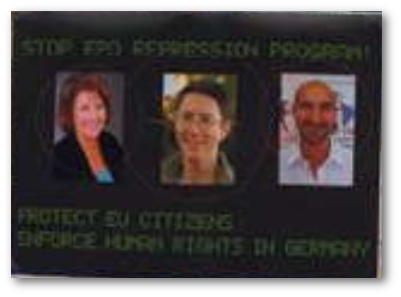01.11.16
Posted in Europe, Patents at 7:28 am by Dr. Roy Schestowitz
English/Original
Publicado in Decepción, Europe, Patents at 9:03 am por el Dr. Roy Schestowitz
Bueno para los abogados y sus super afluentes clientes MALO para el resto…

Efecto de goteo de patentes: grandes corporaciones arriba, debajo sus abogados de patentes, y el público jodido (con juicios, embargos, bloqeos y saqueos).
Sumario: Recojo de información de abogados de patentes, para quienes cualquier clase de apropiación corporativa o monopolio (a traves de patentes) es considerado GANANCIA.
Los portavoces de la OEP y de los trolls de patentes, no pueden detenerse (NI LO HARÁN). Y cuando se mueven (hablan) MIENTEN. Nuestras mándibulas colectivas (no sólo la mía) están por los suelos cuando vemos a IAM decir: ¨El títular es que los jucios de patentes en los Estados Unidos baten records. La realidad es que nunca ha sido duro ser demandante.¨
Las reynas del drama, ¨Demandante¨ simplemente significa AGRESOR DE PATENTES, y en muchos casos estos agresores son patent trolls, como aquellos que págan a ´iam´ (nos cuesta decire esto). Cifras de Patentes Unidas y Lex Machine son cítadas por iam (cuyas fuentes y descubrientos fueron mencionados antes) y iam NO ESTA NEGANDO EL INCREMENTO DE LITIGIOS, sólo encontrado algunos medidas para revolver esas cifras en FAVOR DE LOS ABOGADOS DE PATENTES, quienes reciben dinero de los trolls de patentes. Recuerdén que iam is financiado (a través de eventos) para los más agrésivos trolls de patentes (está explícitamente en su lista de promotores). Hemos cubierto esto antes. Los propagandistas de patentes de ´IAM´ van tán lejos para revolver noticias acerca de las guerras de patentes como si fuesen buenas noticias (en largos artículos).
La gente puede pensar que somos crueles e inmisercordiosos con ´IAM´, pero esta gente es PELIGROSA, ellos están hablando a Manny Schechter, quien promueve patentes de software para IBM [1, 2] así como pare gente de influencia como Wouter Pors (quien en ocasiones crítica a la OEP) usan a ´IAM´ para promover para promover a la Corte Unitaria de Patentes. Hace unos días escribió: ¨la retificación del acuerdo de la Corte Unitaria de Patentes (UPC) por parte de Alemania probablemente será pospuesta hasta Setiembre del 2016 y será decisiva para que el systema de Patente Unitaria (UP) salga en vivo. Woter Pors, socio de la firma de abogados Bird & Bird, ha dicho en una entrevista con Kluwer IP Law. Trece retificaciones son necesarias para que el nuevo systema europeo de patentes comienze a funcionar, incluyendo aquellas de Francia, Reino Unido, y Alemania. Hasta ahora sólo ocho países incluyendo Francia, han retificado.¨
Entonces estaba citando al portavoz de la OEP ´iam´ revista, como sigue: ¨En un reciente reporte de ´iam´, se seńaló que hasta ahora no han habido signos de cuando Alemania retificará el acuerdo de Corte Unitaria de Patentes.
El llamado ´iam’simplemente empuja a Alemania a hacerlo (por lo menos tres veces hemos notado). Al fondo dice: ¨Wouter Pors is uno de los expositores en la Conferencia del Paquete Unidad de Patentes, el 4 y 5 de Febrero 2016 en Amsterdan.¨
Esta es una pro-Corte Unitaria de Patentes promovida por abogados de patentes, notablemente NLO, ¨una de las más grandes firmas europeas proveyendo consejo especializado en el campo de propiedad intelectual en todos sus aspectors por más de 125 años,¨ de acuerdo con la página de sus partidarios.
Se dice que costará unas €1000 para atender, asegurándose que todos los participantes harán eco de esas nefastas propuestas con no divergencia. Es un evento de abogados para abogados, y SUS MULTIBILLINARIOS CLIENTES (compañías como IBM y Microsoft).
Recuerden que es evento pro-UPC promovido por la OEP a través de FTI Consulting, ´iam’está organizando esto. Todos ellos están TRABAJANDO JUNTOS PARA CONSEGUIR MÁS DINERO PARA ELLOS Y SUS RICOS CLIENTES (largas corporaciones multinacionales) al costo de todos los demás. El systema de patentes tiene un moño ribbon rojo, asegurándose que todo quien interactue con el esta presionado a pagar a un abogado (como compartimos en una historia de una PYME).
Dicho ayer por un sitio de un abogado de patentes (linked a una ínvestigación), la barra de patentes se ha convertido en una necesida para muchos. El abstracto dice que la ¨mayoría de abogados no pueden representar clientes en la Oficina de Patentes. La posibiidad de un crítico debate acerca de su tamaño y estructura de la barra de patentes es sorprendentemente dado que innovadores gastan billones de dolares cada año en servicios legales en la oficina de patentes.
Para citar a un periódico (unas semanas atrás): ¨muchas compañías sólo contratan abogados de patentes con experiencia relevante en la área tecnólogica, y no simplemente confían en status de ¨abogado de patentes¨ como calificación.¨
Todo este enredo de patentes y altercados en corte (o con examinadores) es negocio grande para los llamados ¨non-producing¨ actors (aquellos que acumulan patentes) y no los mismos inventores. Los inventores son simplemente los que pierden dinero. PARA QIÉN ES ESTE SYSTEMA REALMENTE? Seriamente, hablen a las PYMEs acerca de sus experiencias negativas con la OEP.
Miren que pasó esta semana en el CES Tech Show de Las Vegas, basado en éste nuevo reporte de la BBC. Para citar al reportero: ¨Los oficiales confiscaron todos los vehículos de una rueda de la compañía y sacaron los letreros y avisos de una compañía rival de Silicon Valley por una supuesta infracción de patentes.¨
Yay, innovación!
Es como la situación de la mafia Sisvel de patentes [1, 2, 3, 4, 5, 6, 7, 8, 9, 10, 11, 12, 13] sólo en los Estados Unidos. Ellos trabajan grandes compañías. Miren al trístemente célebre ´IAM´ defendiendo esto! Ellos DISFRAZAN ESTO COMO AYUDAR AL PEQUEÑO O A LOS INVENTORES, cuando obviamente es exactamente lo CONTRARIO (sólo lo que estan en el mismo negocio son los que están de acuerdo con ´iam´, ejemplo Jeremy Phillips).
No es falta de consideración o rudo señalar quien y donde están. Florian Muller, por instancia parece haber cambiado de opinión para verdaderamente oponerse a software patentes y aquellos que la usan contra Linux. Sin considerar su pasado (INCLUYENDO PAGOS DE MICROSOFT), deberíamos darle la bienvenida de regreso a la lucha contra las patentes de software en Europa y todo el mundo. █
________
* Despues de bloquear mucha gente que no estaba de acuerdo con ellos, ´IAM´ decidió que era futil (no puedes magicamente evitar el criticismo público) y ahora est desbloqueando todos aquellos que fueron bloqueados, supuestamente por ¨año nuevo¨ [1, 2, 3].
Permalink
 Send this to a friend
Send this to a friend
01.10.16
Posted in Europe, Patents at 7:45 pm by Dr. Roy Schestowitz
Summary: Threatening letters sent to people inside the EPO to coerce them into silence, or impose a total lack of involvement in unjust show trials (union-busting moves)
R
epresentatives of EPO staff are under extreme pressure because management of the EPO is squeezing them really hard whilst attempting to maintain the appearance of calm (like the bogus ‘social’ dialogue initiated at the middle of last year). People mustn’t be misled by the appearance of calm. It leads to dangerous passivity and can only ever prevent justice.
“People mustn’t be misled by the appearance of calm.”We have decided to disclose the following letter sent by Team Battistelli a few months ago. One can clearly see the level of threats (to one’s job) for merely discussing an ongoing bogus ‘investigation’ (in practice union-busting). Notice the severity of the threats in page 1:

In page 2 we finally see what the EPO laughably deems “violence” (the PR strategy which paints EPO management as the victim). It’s some private posting which was already removed anyway.

Here again are demands for secrecy. What kind of human rights standards are these? How can the EPO pretend to be a public institution? It abuses people (to whom ILO is too slow to help) and those who dare to speak about this abuse are themselves being accused of abuse (for merely communicating these matters). It is a cyclic thing.
The EPO is an exceptionally abusive enterprise. Thankfully, actions are being taken against the EPO at several levels right now, as we shall show in the coming weeks.
EPO staff needs to start communicating these matters and properly organise against this abusive management. █
“By failing to prepare, you are preparing to fail.”
–Benjamin Franklin
Permalink
 Send this to a friend
Send this to a friend
Posted in Europe, Patents at 7:04 pm by Dr. Roy Schestowitz
Eliminating/purging the messengers, banning disclosure of this purge

Summary: Attempts to silence staff of the EPO are more widespread than is generally known to EPO staff
THE EPO — surprise surprise! — is not an ordinary institution. It’s secretive, it lies (a lot, at the highest level), and it breaks the rules as if none exist.
One important point which is worth making/stressing right now is that EPO staff has been kept in the dark and a lot of staff doesn’t quite realise how bad things really are. There is a reality distortion field, so to speak. Several people whom we spoke to make this ever more evident. “On another subject,” told us one source, “the details [about suspensions] began to reach me with urgency as soon as it happened. I was told the names of the parties involved, and the shocking treatment of the colleagues at The Hague, with whom I was acquainted, but I didn’t quite know what to do with the information because I couldn’t reveal the names of the parties [Jesús Areso, Laurent Prunier, Malika Weaver, Brumme, Michels].” Then there’s the case against Elizabeth Hardon.
Techrights is aware of other affected parties. The EPO does not want anyone to know about this. We predict that later this month a new scandal will be revealed and surface in the press, as the EPO’s gagging efforts non-disclosure agreement equivalent) will become increasingly ineffective. There’s explosive stuff waiting to break out. █
“The price of freedom is eternal vigilance.”
–Thomas Jefferson
Permalink
 Send this to a friend
Send this to a friend
Posted in America, Patents at 6:35 pm by Dr. Roy Schestowitz
Not only the EPO equips patent racketeers

Summary: The U.S. Patent and Trademark Office (USPTO) is finally being accused by companies and people who are suffering from patents (those which it so habitually grants, including software patents) of enabling “extortion rackets”, to quote a respected journalist who attended or covered a session with Michelle Lee, the Director of the USPTO
THE just-ended expo in the United States, CES, revealed the first CES raids [1, 2] that we’re aware of. In fact, only in Europe have we heard of/seen such scenes before [1, 2, 3, 4, 5, 6, 7, 8, 9, 10, 11, 12, 13]. Companies that were at CES reportedly complained to the USPTO about the state of affairs. A highly-reputed journalist was there and wrote that “tech industry still hates patent trolls, but it’s starting to have good things to say about the government agency that issues the patents those trolls later wield in what amounts to a legalized extortion racket.”
“When we accused the EPO of doing something similar the EPO threatened to sue.”Well, companies like Microsoft do this as well, not just patent trolls. Racket is what it is, or an “extortion racket.” We have been saying this for years. When we accused the EPO of doing something similar the EPO threatened to sue. The report continues with: “That was the somewhat surprising conclusion of a panel discussion at CES Friday morning that featured some of the leading critics of the current patent system — and was introduced by Michelle Lee, director of the U.S. Patent and Trademark Office.”
The USPTO still issues software patents (and issued even more of them before); these are the sorts of patents that almost all patent trolls are using, so the USPTO ought to be held at least partly accountable. Ever since the Court of Appeals for the Federal Circuit (CAFC) gave the green light to software patents the USPTO has issued hundreds of thousands of software patents. CAFC, as we have shown before, is corrupt at several levels (see past articles) and hence highly biased. Patents lawyers’ fronts such as Post-Grant Practice Group (profiting from patent maximalism) have just latched onto CAFC, as expected, saying that “efficacy of objective evidence of non-obviousness (i.e., secondary indicia) hinges on the ability to demonstrate a “nexus” between the evidence and the subject patent claims. This is because such evidence cannot be accorded substantial weight absent a nexus to the claimed invention. As pointed out in a previous post a compelling showing of nexus is more likely in the unpredictable arts where specific formulations, dosages and the like are more readily correlated to such secondary indicia as commercial success and long-felt but unsolved needs.”
“It is evident that producing technology companies (excepting monopolies that use their brands and their patents, not production) are dissatisfied with the status quo.”The wording/words in the above article/blog are designed to mislead (they’re hard to read/follow because clarity isn’t the goal). What they are trying to allude to, in simpler terms, is that “non-obviousness” (i.e. difficulty of coming up with an idea) can be demonstrated with claims (in the patent application) and evidence. A lot of these foreign language (or cryptic) terms are the way patent lawyers make their business. They make the language (legalese) hard for many people to follow (even to examiners who are purely technical) and this way they can trick people into granting what’s not grantable (patent-ineligible).
There still needs to emerge a movement strong enough and broad enough to antagonise the likes of CAFC, the USPTO, and patent lawyers because they are all patent maximalists. Maximalism benefits them directly. It is evident that producing technology companies (excepting monopolies that use their brands and their patents, not production) are dissatisfied with the status quo. █
Permalink
 Send this to a friend
Send this to a friend
Posted in Europe, Patents at 5:57 pm by Dr. Roy Schestowitz
Going after the scapegoats at the top would only backfire, patently so…

Summary: A look ahead at what basically constitutes another phase in the EPO’s effort to fire high-profile critics and scare the rest of them
THERE HAS not been much public output regarding the EPO as of late. EPO accounts (Web site, Twitter etc.) are barely active, SUEPO administrators are away, and “EPO President, Mr. Battistelli,” told me one person today, “will be in South America-Colombia on January 29, talking about Unitary Patents.” Here we have evidence that UPC lobbying carries on. Thou shalt not interfere with Battistelli’s Grand Plan.
“The EPO’s management made a grave mistake when it attempted to silence dissent rather than quell is by mutual understanding, concessions, recognition, etc.”A staff protest is just a week and a half away (support for the EPO staff unions is seemingly at an all-time high), coinciding with some decisions regarding the fate of staff representatives.
The EPO’s management made a grave mistake when it attempted to silence dissent rather than quell is by mutual understanding, concessions, recognition, etc. Various members of staff now pass around fliers, the SUEPO’s bulletin, links to news sites, links to the Web site of SUEPO and so on. The more people read, the most they support the unions and resent their management. The staff is now overwhelmingly in support of SUEPO and it follows what SUEPO is saying, be it in the SUEPO Web site or even the occasional bulletins. “It used to be called “SUEPO inform”,” one reader told us, “and was essentially a local affair of The Hague. There was more or less four incarnations of SUEPO, one for each main sites [DH, BE, MN, VI], in addition to the staff representations, with different, sometimes non-converging, agendas and personalities. Battistelli seems to manage the unthinkable: unite the sites in one force.”
“Battistelli seems to manage the unthinkable: unite the sites in one force.”
–AnonymousThe accusations against SUEPO figureheads are shocking not because they’re severe but because they’re indicative of a desperate effect by EPO management to crush all unions (starting with the biggest one, SUEPO). If all goes as planned, within just a few days staff of the EPO will be notified of these ludicrous allegations. There is no legal process, as there is no separation between the accuser, the judge, the executioner etc. It’s quite a circus! It’s theatre rather. It’s designed to only give the impression of due process, but it’s done in secret because it follows North Korean standards. It would embarrass any European country, even those formerly part of the Soviet Union. █
Permalink
 Send this to a friend
Send this to a friend
Posted in America, Europe, Patents at 7:27 am by Dr. Roy Schestowitz
 Summary: Europeans, including European companies such as Metaswitch (British), continue to suffer from software patents in the United States and from British patent lawyers to whom the whole notion of software development is elusive, grossly misunderstood (they profit from the misunderstanding)
Summary: Europeans, including European companies such as Metaswitch (British), continue to suffer from software patents in the United States and from British patent lawyers to whom the whole notion of software development is elusive, grossly misunderstood (they profit from the misunderstanding)
HAVING written literally thousands of articles on this subject, it often feels like repetition even when it isn’t. It’s never repetitive because new cases and new observations come to light. The other day, Patent Buddy fished out this recent court’s decision [PDF] (originally OOXML) and said that “TX [Texas] Magistrate Report Rejecting Alice101 Ineligibility Argument Against a Firewall Patent” (used against Metaswitch Networks, a British company). We have looked at this 18-page decision and found Alice mentioned in page 3 as follows: “The Supreme Court has held that there are three specific exceptions to patent eligibility under § 101: laws of nature, natural phenomena, and abstract ideas. Bilski v. Kappos, 561 U.S. 593, 601 (2010). In Mayo, the Supreme Court set out a two-step test for “distinguishing patents that claim laws of nature, natural phenomena, and abstract ideas from those that claim patent-eligible applications of those concepts.” Alice Corp. Pty. Ltd. v. CLS Bank Int’l, 134 S. Ct. 2347, 355 (2014) (citing Mayo Collaborative Servs. v. Prometheus Labs., Inc., 132 S. Ct. 1289, 1296–97 (2012)).”
“So here we have a British company sued in the capital of patent trolls, by a company called Genband LLC, which is based in Frisco, Texas, the United States (where the lawsuit is also being poorly assessed, determined and ultimately ruled against a foreign company).”Alice is also mentioned many times in page 4, then 14-15 and in page 17 it says: “Metaswitch is likewise wrong to characterize “an application proxy” and “a packet filter” as inherently abstract components because they refer to “broad ‘types’ or ‘classes’ of firewall components and do not require or connote any specific structure.” (Dkt. No. 255 at 24). A hypothetical claim limitation directed to “a cup” might encompass an extensive class of objects of varying shapes, sizes, materials, and functions (a coffee mug, a champagne flute, a disposable paper cup), and thus the word “cup” is abstract in the sense that it spans many different structures. But a cup is not an “abstract idea” in the sense meant by Alice, and neither are the “application proxy” and “packet filter” components recited in the claims. These components are not “building blocks of human ingenuity,” “a method of organizing human activity,” a “fundamental truth,” an “idea of itself,” or the like. See Alice, 134 S. Ct. at 2354–56. The “application proxy” and “packet filter” terms refer to specific components that have been construed to perform specific functions within a network. See (Dkt. No. 310 at 7–13). The fact that these components can be implemented in the form of “hardware and/or software” does not change their concrete, network-specific nature.”
So here we have a British company sued in the capital of patent trolls, by a company called Genband LLC, which is based in Frisco, Texas, the United States (where the lawsuit is also being poorly assessed, determined and ultimately ruled against a foreign company). In page 18 it says: “For the foregoing reasons, Claim 12 of the ’561 Patent is patent-eligible under § 101. The Court agrees with Metaswitch that Claim 12 is representative for purposes of the § 101 analysis; the other asserted claims of the ’561 Patent are likewise patent-eligible.”
Here is the court’s conclusion: “For the reasons stated above, summary judgment of no willful infringement should be GRANTED. Partial summary judgment of no indirect infringement prior to April 14, 2014 should be GRANTED. Partial summary judgment of no indirect infringement after April 14, 2014 should be DENIED. Summary judgment of invalidity under 35 U.S.C. § 101 should be DENIED.”
“Why is a British company on the receiving end of software patents when British law clearly does not include but preclude such patents?”This is a classic case where software is being described as non-abstract by trying to tie it to “network” and the likes of that. There is a whole infamous class of “over the Internet” patents and this one too resembles that. The decision cites a case of the world’s largest patent troll, Intellectual Ventures v. Capital One Bank, in page 4 along with Alice and Bilski.
How clueless could the judge be? Did the judge ever write a computer program? Was a degree in some scientific discipline earned/acquired? Was the judge bamboozled by mumbo-jumbo from lawyers? Why is a British company on the receiving end of software patents when British law clearly does not include but preclude such patents? Does US law dominate globally? Well, rhetorical question actually. This is similar to the cases of Finjan, which is a patent aggressor in a similar field of technology.
As a British programmer myself, I cannot help but worry that the Texan courts now threaten the British industry as well. The UPC would make things even worse and there are already signs of that happening with patent trolls that come to Europe and attack from London (Unwired Planet). Apple too is attacking companies from inside Europe, with help from ridiculous software patents that are found invalid by European courts after EPO negligently issues them. Recall the case of Wi-Lan v. Apple, which pro-software patents sites are writing about these days. Why is the industry tolerating this? How can anyone wrongly deduce that this is good for innovation, or in other words, encourages the creation of better computer products, programmes, etc. available in the market?
“Developers of software don’t brainstorm or innovate, they typically take existing building blocks (either Free/Open Source software or proprietary with compartmentalised modules/layers/standards) and combine these to form bug-free and increasingly efficient algorithms.”When patent lawyers, who don’t actually create anything, speak of (or hijack the word) “innovation” we end up with clueless blog posts such as this new one from IP Kat. While EPO coverage from IP Kat has been rather good, much of the rest constitutes UPC promotion, patent maximalism, and clueless prose such as this: “Second is the recurring assertion that the patent system is intended to encourage innovation. There are various implications that flow from this, most notably that any patent that does not further the innovation interest is at odds with the patent system. Weak patents, patent trolls, patent thickets, patent hold-up and other patent undesirables all derive from the underlying assumption that patents are the hand-maiden of innovation. As such, at least in the US, a material driver of proposed patent legislation is to better align the patent system with the needs of innovation. The only problem with this view is that it is not correct. Patents are about encouraging invention and not impeding competition in a manner consistent with the patent grant, where the legal system has developed tools to define invention. Some forms of innovation (however defined) can be expected to flow from improving the manner by which we encourage and protect invention, but innovation is not a surrogate for invention. Introducing innovation as a construct within the patent system, parallel to invention, novelty and inventive step, is simply inappropriate.”
“Software developers don’t “invent”. They write code, and some code may be better than other.”The above says “innovation is not a surrogate for invention”, but these are just clueless repetitions (regurgitations) or rather meaningless/vague terms, none of which actually alludes to or pertains to programming (these words predate computer programs). Developers of software don’t brainstorm or innovate, they typically take existing building blocks (either Free/Open Source software or proprietary with compartmentalised modules/layers/standards) and combine these to form bug-free and increasingly efficient algorithms. Everything is being reused and built on top of existing work. One should expect people who never saw or wrote a computer program to actually grasp this. The comments from readers, who are mostly patent lawyers, are equally clueless or weak. One says regarding “Innovation vs. Invention”: ”
If innovation = ‘new’
Then innovation is one prong of a three-prong test for invention.
The other two prongs are ‘useful’ and ‘non-obvious’
Software developers don’t “invent”. They write code, and some code may be better than other. Lawyers using terms like “innovation” are clueless. They’re reusing terms from centuries ago and another one says
One has to focus on the fact that the patent system is about disclosure of inventions. Although such disclosure may impact innovation, invention and innovation are not the same thing. One looks at various comments distinguishing the two.
What needs to be assessed is whether more (or less) code is generated which is solid and reliable in the presence of 100,000-1,000,000 software patents. Evidence suggests that patents have done virtually nothing to provide an incentive to write better (or more) algorithms; programmers don’t even bother reading patent applications (it’s infeasible). They just get sued, often by trolls that produce nothing at all.
“Evidence suggests that patents have done virtually nothing to provide an incentive to write better (or more) algorithms; programmers don’t even bother reading patent applications (it’s infeasible).”It should be noted that several people sent us links to the above article and several programmers expressed annoyance at this level of ignorance. Why is a system that presents itself as “protecting inventors” (or whatever) run by non-inventors? When will it be geeks and computer science professors running such courts* (if any courts “as such” are necessary at all)? The system, as is, became besieged by parasites preying on software developers, rather than people with the required skills and knowledge. It’s a form of takeover or coup. Programmers need to unite so as to fight to regain control. █
___
* I myself have been writing software since I was 14 and it’s what I currently do for a living in many languages and paradigms, as well as (peer) reviewing papers about software for international journals, so the opinions above don’t come from a position of cluelessness but from genuine concern for a scientific discipline which multinational conglomerates want to monopolise as a matter of law.
Permalink
 Send this to a friend
Send this to a friend
Posted in Europe, Patents at 5:26 am by Dr. Roy Schestowitz
English/Original
Publicado en Europe, Patents a las 8:18 am por el Dr. Roy Schestowitz
Contra EPO

Sumario: Antiguas quejas contra la discriminación contra los Hispano hablentes, ha quedado demostrado actualmente al conversar con personal de la OEP.
El Español – es de acuerdo al algunos criterios y dependiendo las definiciones que uno escoge – el lenguaje más hablado en el mundo (basado en el número de países donde es lengua primaria). Techrights en Espańol es su segundo lenguage tiene árticulos públicados en Español
“El lenguaje Espańol raramente existe en la OEP. Definitivamente NO es tratado como debería y uno no necesita mirar muy atrás para ver como la OEP, basada en Munich máltrata a su personal Espańol.”La OEP díscrimina contra muchos lenguajes Europeos, pero sólo los Espańoles e Italianos tienen los huevos de hacerlo notar, en íncluso pelear acerca de esta materia tán importante (PERPETUAR POWER A TRAVES DE LA DOMINACION DEL IDIOMA, como los ingleses lo han hecho por siglos). La cuenta de Twitter de la OEP SOLO ESCRIBE EN INGLES, promoviendo traducciones automatizadas al día siguiente, pero éstas son inferiores. Aquí esta la herramiente ellos recomiendan (advertencia es una link de la OEP). ¨Tradusca Patentes,¨ dijeron en Twitter hace unos días, ¨viene con un corrector automático, que te permite proponer mejores traducciones¨ (bueno eso es ´crowdsourcing´ hacer a los Españoles ¨voluntarios¨ de las grandes CORPORACIONES – tóntos útiles- para sus propias ganancias).
El lenguaje Espańol raramente existe en la OEP. Definitivamente NO es tratado como debería y uno no necesita mirar muy atrás para ver como la OEP, basada en Munich máltrata a su personal Espańol. Uno de ellos tuvo una crisis nerviosa un par de meses atras después de haber sido maltratado por estos hijos de [1, 2, 3, 4, 5, 6, 7].
“Al menos pueden demandar que la OEP, no trata al Español como inexistente”Reciéntemente nos enteramos de otras formas de DISCRIMINACION contra los Españoles en la OEP. ¨Estaba leyendo este artículo,¨ una persona nos escrbió acerca de un artículo que publicamos en Español hace unos días¨, esta persona nos dijo ¨Pedí por Espańol como lenguaje de oposición, cuando estuvimos oponiéndonos a la Regalo de Amazon patente¨, ¨Recibimos una ´amable´ llamda teléfonic así como un corre eléctronico de la OEP diciéndonos que si queríamos Español, teniamos que pagar por un traductor, mientras que alemanes o franceses no tendrían que pagar por traducciones simúltaneas durante los proceduras orales.¨
Esto es revelador? No es cierto?
Decidimos investigar más profundamente esto por que es una queja común (compartida entre miembros de la Unión Europea); sólo los Espańoles tienen suficientemente voz fuerte (más población) y un buen argumento para incluir su lenguaje por que es increíblemente popular, (segundo lugar después del Chino, Arabe, e Inglés depende de la definición de popularity). Se hizo notar este prblema cuando se debatía la viabilidad del Corte Unitaria de Patentes una vez. La gerencia de la OEP quiere aprobar la UPC a todo lugar (CABILDEA POR ELLO ABIERTAMENTE), pero el pueblo Espańol si se organiza apropiadamente puede y DEBE evitarlo. Al menos pueden demandar que la OEP, no trate el idioma Espańol como inexistente. Algunos grupos ya se han quejado pero nada resulto del esfuerzo.
¨Envíamos esta solicitud en Espańol,¨ nos escribió la misma persona (cuyo nombre puede encontrarse en las links si uno esta desesperado de saberlo), y la traducción al Inglés es suya. Pobrecito, termino bajado miles de páginas en la OEP register para ubica el PDF correcto” en este enredo. La carta original es la siguiente (de la FFII):
Bruselas, 07 de mayo 2012
Sujeto: EP927945: el lenguaje de la vista oral de 12 de junio 2012
Estimados Miembros de la Oficina Europea de Patentes,
FFII eV ha recibido su carta del 16 de abril 2012 en relación con la elección de las lenguas de los procedimientos orales con respecto a nuestra oposición a la patente de regalo de Amazon EP927945.
Tenemos la intención de usar el español tanto para los procedimentos por vía oral (habla) como para la interpretación simultánea (escucha).
Saludos cordiales,
Y en Inglés:
Brussels, the 7 may 2012
Concerns: Amazon gift patent EP927945: language of the oral
proceedings of 12 June 2012
Dear Members of the European Patent Office,
FFII eV has well received your letter of 16th of April 2012 regarding the choice of languages of the oral proceedings regarding our opposition to the Amazon gift patent EP927945.
We intend to use Spanish for the both the language of the oral proceedings (speaking) and the simultaneous interpretation (listening).
Best regards,
¨La link para la registración de la OEP está aquí, dijo desafortunadamente su website es inferior que tu no puedes bajar el PDF con wget. Aquí esta nuestra respuesta a su rechazo. Tratando de encontrar el original en texto pleno…¨
“Qué mierda está pasando, cómo devino a tan malo, y porqué los Españoles no vociferan acerca de esto?”Su respuesta oficial esta aquí.
¨Tratando de recuperar el correo electrónico de (la persona) quien es Español,¨ escribió, ¨cuando recibió una llamada telefónica de la OEP que resulta en la siguiente antigua carta…¨
Lo suiguiente no necesita explicación:
Querido jurado,
este correo es privado, no lo replique, etc.
Una seńora hablando alemán de la OEP, acaba de llamar a la oficina. Hablaba como si siguiera un libreto. Pregunta de parte mía, respuesta de ella. Muy bien entrenada. He resumido.
El señor [redactado] ha enviado un fax en Español :-), pero el ESPAÑOL NO ES UNO DE LOS TRES LENGUAJES ACEPTADOS POR LA OEP, Por supuesto dije esto NO ES BUENO para las personas de habla Española en la Unión Europea, bla, bla. La clásica respuesta las tres lenguas oficiales de la OEP, bla, bla, adicionalmente la OEP ofrece a no costo una lista de traductores bla, bla, que podemos contratar (Y PAGAR a diferencia de los demás). Pedi por esta respuesta en escrito, ella dijo que no puede responder a un fax en Español, deberíamos enviarle un fax en uno de los tres lenguajes oficiales de la OEP y luego ella respondería. Pidió que lo hagamos rápido, ya que no se puede enviar faxes en Español desde la OEP.
En conclusión, extrañamente el Español esta siendo relegado por la OEP, mientras que el Francés (con mucha menos naciones que puedn hablarlo) es un lenguaje ¨oficial¨. Lo mismo para el Alemán que no mucha gente lo habla (excepto en Alemania misma). SON LOS MIEMBROS ESTADOS TRATADOS FAVORABLEMENTE DE ACUERDO A SU PODER FINANCIERO opuesto a su audiencia internacional y local (Portuges es más popular que Frances y Alemán, incluso combinados por otro criterio)? Qué mierda está pasando, cómo devino a tan malo, y porqué los Españoles no vociferan acerca de esto?
¨La Oficina Europea de Patentes nos está JODIENDO! Ya es tiempo de hacer algo. O se corrije la situación o Espańa debe abandonar la Unión Europea y su jurisdicción¨
Un Hispano hablante! █
“La Oficina Europea de Patentes es una Corrupta, Maliciosa Organizacion Que NO debería Existir”
–Richard Stallman
Permalink
 Send this to a friend
Send this to a friend
01.09.16
Posted in America, Asia, Patents at 7:34 am by Dr. Roy Schestowitz
Companies can now literally steal other companies’ products because they claim that patent infringement is “theft”

Death penalty: killing people to demonstrate that killing is wrong
Summary: Companies from the US are trying to teach companies from China that ‘stealing’ (alleged patent infringement) is wrong by basically stealing (literally!) their products in a trade show in the US, even though both China and the US have a notoriously low bar for patenting (includes abstract concepts, as long as they’re not framed as such)
TWO countries where the quality of patents is notoriously low (hence a high number of patents) are China and the US. We wrote many articles about it before. Quite a few Chinese companies are now building up/amassing stocks of thousands of patents, catching up with their US-based counterparts (which manufacture all their products in China anyway). Who benefits from this? Conglomerates and their lawyers, at everybody else’s expense.
“Quite a few Chinese companies are now building up/amassing stocks of thousands of patents, catching up with their US-based counterparts (which manufacture all their products in China anyway).”Years ago we showed how trade shows had been transformed into raiding opportunities [1, 2, 3, 4, 5, 6, 7, 8, 9, 10, 11, 12, 13], causing a major scene out in public, degrading confidence, and destroying the reputation of certain events/trade shows. These raids are now a reality in the US because Onewheel from Future Motion decided to go litigious with patents and actually confiscate another company’s products, which it can make itself in China. This has raised quite a few eyebrows. What would attract east Asian companies to America (or the US), where you can officially — but without notice — be raided over patents? All this disruptive U.S. Marshals’ involvement because of patents alone? As a little background to this, see TechDirt‘s coverage: “One of the big stories coming out of CES this week is the bizarre situation in which US Marshals showed up here at the event yesterday and completely shut down the booth of a Chinese company, named Changzhou First International Trade Co. This happened after a judge granted a motion for a temporary restraining order, filed by US company Future Motion, following a seven minute hearing about the matter, in which Changzhou was not present and had no say. [...] In other words, there’s a fair bit of evidence to support that the patent infringement case is fairly strong. That said, it still seems quite troubling for US Marshals to then get involved and completely shut down Changzhou First International Trade Co.’s booth at CES right in the middle of the show, when the company doesn’t get a chance to present to the judge until January 14th, long after CES has packed up and left town.”
This story involves a Chinese company coming to the US. China and the US have some things in common when it comes to patents, as both countries’ patent offices (SIPO and USPTO) have very low-quality patents and approve almost everything (poor quality control). Patents for patents’ sake, regardless of the consequences! In the US, unless you’re a rich and highly determined defendant, you never know if a patent is worth something unless challenged for years in the courts. USPTO examination is being grossly rushed, so prior art search is somewhat of a joke. We wrote about this for years. There is this new article titled “U.S. and Chinese Courts’ Software Patent Requirements” and it says that “In China, software inventions that comprise only rules and methods for intellectual activities are not patentable. Thus, a claim that describes an algorithm, mathematical rules, or computer program “as such” and alone may not be patented. However, software inventions that comprise both rules and methods for intellectual activities and technical features of means in order to solve technical problems and obtain technical effects can be patented. Software that (a) uses a technical solution to (b) solve a technical problem concerning (c) a law of nature, may comprise patent eligible subject matter and are subject to patent law protection. The subject of the patent must pass the three part test and still must satisfy the basic requirements for patentability—novelty, non-obviousness, and usefulness—the same as in the U.S.”
“A lot of startups in the US are rightly worried about software patents.”Notice the use of the term “as such” and recall how Brimelow arguably brought to Europe or made it possible to bring to Europe software patents.
A lot of startups in the US are rightly worried about software patents. A couple of days ago somebody published “Arguments you can make against software patents as a startup CTO” [via Bessen and Henrion].
To quote some bits from it:
Most software engineers believe that software patents are bad for innovation, and shouldn’t exist. Unfortunately, this isn’t a good argument against filing for software patents, since it’s essentially a complaint about the rules of the game, but as a startup CTO you still have to play the game, regardless of what you think of the rules.
Many CTOs of seed or A-round companies find themselves under pressure from non-technical co-founders and investors to spend time and money on software patents. While I don’t always win the debate, I can say with confidence that the return on investment on all of this time and effort was precisely $0 in every case.
[...]
When people ask about my “IP defensibility” strategy, I generally argue for trade secrets. They’re free, require no effort, you’re not disclosing potentially important information to competitors, and they basically lack any of the other shortcomings I describe above.
IBM’s Manny Schecter/Schechter has just published this paper. It speaks about the effects of Alice on business method patents, not just software patents, which Schecter and his employer support [1, 2]. “Many sources track aspects of PTAB outcomes,” says the abstract, “but none have specifically analyzed CBM outcomes at both the institution and final decision stages by ground. Practitioners, policymakers, patentees, and petitioners can benefit from an empirical analysis of outcomes. Our study analyzes CBM outcomes according to the basis for the challenge and examines whether the Supreme Court’s ruling in Alice Corp. Pty. Ltd. v. CLS Bank Int’l, 134 S.Ct. 2347 (2014) (Alice) makes § 101 grounds more popular in CBM petitions. We also investigate the effect of Alice on CBM petition filing and success. We determined that there were more § 101 challenges in CBM filings post-Alice.”
Patent lawyers are rightly worried (for themselves) that a lot of patents would no longer withstand challenges in/from a court of law. There is more uncertainty for them. Whether or not these patents are worth something, injunctions, embargoes and even raids remain a scary prospect to companies that actually produce things. █
“Though force can protect in emergency, only justice, fairness, consideration and cooperation can finally lead men to the dawn of eternal peace.”
–Dwight Eisenhower
Permalink
 Send this to a friend
Send this to a friend
« Previous Page — « Previous entries « Previous Page · Next Page » Next entries » — Next Page »







 Summary: Europeans, including European companies such as Metaswitch (British), continue to suffer from software patents in the United States and from British patent lawyers to whom the whole notion of software development is elusive, grossly misunderstood (they profit from the misunderstanding)
Summary: Europeans, including European companies such as Metaswitch (British), continue to suffer from software patents in the United States and from British patent lawyers to whom the whole notion of software development is elusive, grossly misunderstood (they profit from the misunderstanding)

















 Content is available under CC-BY-SA
Content is available under CC-BY-SA